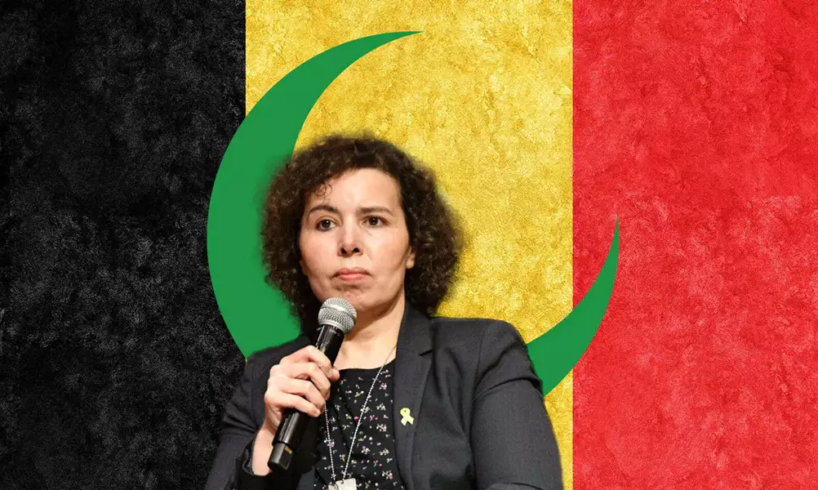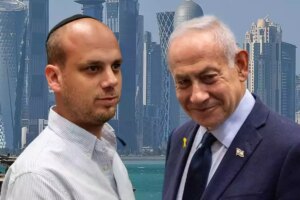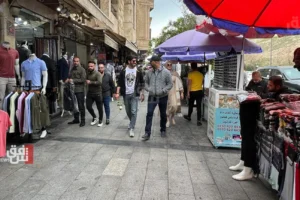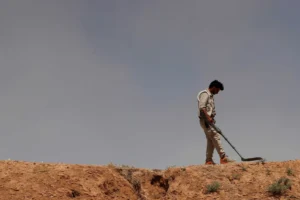
“The awareness awakened gradually, starting from the end of my adolescence. The speeches of people from the ‘Islamic Salvation Front’ in Algeria, heard in some mosques and among families, heralded what was to come. It was clear that sooner or later, this violence would also erupt in the West. We were aware of it, but no one shared the warnings with non-Muslims. Such things weren’t customary to share with them. Then, on September 11, 2001, everything became clear. When you come from a Muslim family, you pick up the codes, the hints. The young people who traveled to fight in Syria and Iraq only accelerated a movement that already existed, born from the Mujahideen war in Afghanistan against the Soviet Union. In the 1980s, it was a marginal phenomenon, but after 2001, everything changed. The giant collapsed before the eyes of the Muslim world. The attacks in Europe, our leaders’ inaction, and especially the experts’ inability to give a real explanation for the problem – all these made me understand we’re facing big trouble. The peace we knew wouldn’t hold. Since 2005, the attacks and assaults no longer surprised me – but the West’s inaction actually did surprise.”
Q: The Islamists actually acted – they threatened to murder you.
“They directly called to punish and kill me. The most frightening threat came with an ISIS video showing different execution methods – slaughter, burning alive in a cage, and beheading. It displayed real scenes, alongside wishes that I die a slow and painful death. It didn’t stop there. They chased me, threatened to harm me physically, conducted a campaign of legal harassment against me. I lost my job, they no longer give me the right to speak in French-language media in Belgium. I can’t work anymore.”
Q: How did family members and friends react?
“My family has shunned me since I supported Israel, and over time it’s gotten worse. Some of my friends are afraid to meet with me, others don’t want to talk about these things, they prefer to live in denial. In the end, my real friends stayed and I built myself a different family, one I chose.”
Willfully blind
Q: What do you think is the scope of radical Islamist influence today in Belgium, compared to the previous decade or two?
“The influence is absolute. In my view Belgium has fallen under Islamist control, especially that of the Muslim Brotherhood. And it will only get worse, because Hamas members and Hamas supporters have been welcome in Belgium since October 7, 2023. We literally brought here people who will turn Belgium into Lebanon. The danger already looms from within Belgium, while the state still sleeps, whether out of opportunism or cowardice. Ultimately this will affect all the West, because Belgium houses the European institutions and NATO.”
Q: Haven’t the authorities in Belgium internalized the severity of the problem?
“I think at first they really weren’t aware of it. When they started to catch on, they thought they could control the Islamists to win Muslim votes. In the end, when they understood, it was already too late.”
Q: In what forms does the radicalization express itself?
“The Islamists advance quietly in every sector and every area of society – in schools, children and parents pressure teachers and administration on issues like wearing hijab and supplying halal meals. At universities, student organizations connected to the Muslim Brotherhood movements invite lectures by terrorists, or extreme figures like Francesca Albanese and Rima Hassan. Islamist influence reaches everywhere – political parties, associations, mosques, transportation, security services, social networks, the justice system and other arenas.”
Q: What role does foreign funding from Qatar or Turkey play in spreading Islamism in Europe?
“Very large sums, which fueled the process, indeed arrived from abroad. Now there’s slightly more supervision of this matter, but the Islamists receive funding for non-profit projects also through European institutions and from Belgian authorities. And we mustn’t forget the phenomenon of dual citizenship, which allows transferring money to Belgium from the country of origin without declaring it.”
European Union flags flutter outside the EU Commission headquarters in Brussels, Belgium, September 28, 2022 (Photo: Yves Herman/Reuters) Yves Herman/Reuters
The deterioration Maaroufi describes could have been prevented if Europe hadn’t been blind to what was happening. In her view, this is willful blindness. Those charged with protecting Europe from the Islamist plague refuse to admit its existence and silence the watchmen at the gate. “It’s a tyranny of political correctness,” Maaroufi said. “They even forbid using terms that define the problem, with claims of ‘Islamophobia.’ Increasingly, people are preventing themselves from thinking and speaking. There’s real self-censorship – as if not to offend Muslims, or simply out of fear they’ll slap you with an extreme right label or murder you. Since the assassinations of Samuel Paty and Dominique Bernard, people are very frightened. European elites hesitate to speak openly about Islamist extremism, because they’re already infected by Islamists who did the work from within – carried out a value inversion, where victims become the convicted and the convicted become victims.”
Maaroufi’s battle against Islamization is inseparable from her feminist views. For her, these are two faces of the same aspiration for freedom. “To be feminist is to demand for women full autonomy over their bodies, thoughts, and destinies,” she explained. “Feminism fights a hierarchy based on gender affiliation; Islamism sanctifies it. It accepts male rule as a moral obligation, turns women’s bodies into a religious and social issue, and confines women to the role of guardians of the group’s honor. The hijab, according to this logic, isn’t a simple clothing item – it’s the flag of the Islamism project. It marks that the woman doesn’t completely belong to herself – she becomes symbolic territory that must be protected from the ‘impurities’ of the modern world.
“I refuse to have them explain to girls born in Europe that they must hide themselves to ‘respect’ themselves. I refuse to have them learn that their freedom is a provocation, or that their liberation endangers community morality. My feminism isn’t a slogan – it stems from personal experience. For more than 20 years, as a social worker, I saw the real effects of Islamization in working-class neighborhoods – regression in women’s freedoms, pressure on the female body, insults over jeans considered too tight, refusal to meet with others, and fear of shame. I saw girls erasing themselves so stigmas won’t be cast on them, women giving up work, recreation, and laughter. Feminism, for me, is refusing this erasure.”
Q: Here again, you’re headed for an unavoidable collision with Belgian elites, who are strong in talking about feminism but surrender immediately when the harm to women comes from the direction of Islamism.
“The hardest challenge is really the blindness of the left and non-Muslims, who gave up on the idea of helping liberate Muslim women. In effect, they’re telling us to stay in our place, stay imprisoned. I think they made me a deterring example. Many people see the prices I was required to pay, understand the risks are enormous, including mortal danger, and don’t dare express themselves openly.”
Q: What’s your opinion on bans on wearing hijab and niqab, a subject discussed more and more throughout Europe?
“I think they should be banned in schools, universities, and among minors. This is a norm that draws separation between devout believers and non-believers, and also between men and women. This norm is imposed as an obligation, and when someone decides to remove the covering, she must expect trouble, pressure, attacks, and harassment.”
Q: Do Muslim girls in Europe feel torn between Islam and modernity?
“Not necessarily. Many of them simply fear rejection by family and community if they choose to be themselves. Becoming free sometimes means risking everything – family status, relationships, social security. Personally, I’ve never felt as good as I do now that I’ve freed myself from the pressure and lies my community taught me from childhood. The last three generations of Muslim women in the West underwent Islamist brainwashing, and it worked – the first and second generations of women aspired to freedom, while the current young generation is confused. The women in it allow others to influence them, and get dragged into believing they want to become slaves by choice.”
Fadila Maaroufi holds an Israeli flag (Photo: Fadila Maaroufi)
“Democracy for us, not for Jews”
Although two years have passed since the October 7 massacre, Maaroufi doesn’t forget how the Muslim communities reacted to the horrors the Gazans committed in the Gaza border communities. The initial reaction was silence, and immediately after, hostility toward Jews and Israel erupted. “The Israeli-Palestinian conflict has always served as glue for uniting the Muslim community,” Maaroufi noted. “There’s no longer room for any thinking, and whoever raises doubt about the justification for the attacks becomes an enemy of the Islamic nation.”
Unlike most Muslims in Belgium, Maaroufi expressed solidarity with the victims of the Israeli massacre. “I was deeply horrified by the horrific acts the terrorists committed – the lives of children, babies, women, and men, cut down horrifyingly. If we support humanism, we can’t ignore the massacre victims. I salute in my heart all the victims of the October 7 massacre, their family members, and the IDF soldiers who fell. Israel defended its people, but in my view, also the stability of our entire Western democracy. On October 7, the monster was released. I fear this isn’t an isolated incident – as long as we don’t fight Islamic antisemitism firmly, we’ll remain vulnerable.”
Q: What image does Israel have in the Belgian public, and how much does Islamist propaganda influence it?
“Many Belgians support Israel and Jews, but fear is felt – people who aren’t Jewish tell me, in secret, that they support Israel but suffer verbal or physical attacks when they express it publicly. In practice, only support for Palestinians can be expressed without risk. As long as political leaders don’t adopt clear discourse, and as long as part of the media funded by our tax money continues spreading narratives that favor Hamas and Islamists, the dark ideologies will strengthen.”
Q: Have you faced backlash in Belgium for your support of Israel?
“Yes, and it only intensified since October 7. Since 2023, the pressure and propaganda against me have pushed me to increase appearances and conferences, to explain the situation and mobilize support for the Jewish community, which often falls victim to attacks. To illustrate, consider the following recent case. Last month, I participated in a rally for the hostages and against antisemitism. After we marched, a group of about 15 rally participants entered a cafe in Albertine Square. When we wanted to leave, two people approached us shouting, ‘We’ll beat you, we’ll beat the Israelis and Jews.’ A very tense atmosphere developed, and we were forced to escape inside. I called the police. The place manager helped some people hide behind the bar, and friends intervened to protect the most vulnerable. One attacker, apparently the leader, shouted at those trying to calm down, ‘Democracy is for us, not for Jews.’ Police finally intervened, and two people were arrested thanks to a photo taken by a witness of the incident. They finally escorted us to a safe place, but the harassment continued even there, when one car honked, aiming to frighten us. We submitted all the material to the police, including photos, but to this day, no real legal action has been taken.”
Q: What message would you like to convey to the Israeli public, which also lives under the threat of radical Islamism?
“Don’t give up. Here too, in Belgium, we’re fighting for you and for our society. We share the same enemies, so we must learn from our shared experiences and cooperate. We aspire to protect our children and ensure a future of peace. We must fight to prevent violence and Islamist ideology from taking over.”





